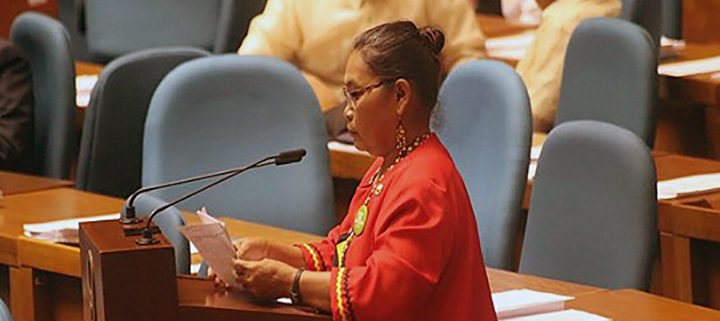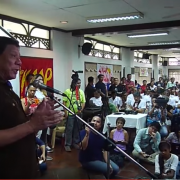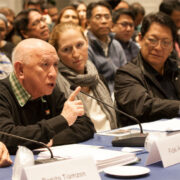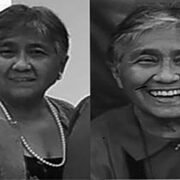1st Manobo in Congress vows to defend Lumad schools, national minorities’ rights over ancestral lands
The member of the 18th Congress who probably has the least formal education took to the floor of the House of Representatives last Monday, July 29, visibly nervous but delivered the most powerful speech of the night nonetheless.
Neophyte representative Eufemia Cullamat of Bayan Muna delivered her first privileged speech, vowed to defend the Lumad schools that are under attack by government forces, and called for the respect of the indigenous peoples’ right to self-determination over their ancestral domains.
Cullamat apologized for what she feared may be mispronounced words, but she soon hit her stride and passionately delivered her seven-page speech.
“I admit I am one of the very few members in this hall who may have only finished elementary education and finds it difficult to understand English words or read them. I am living proof of the government’s failure to provide education for everyone because the nearest school from where I live is 20 kilometers away,” Cullamat said in Filipino.
A member of the Manobo tribe from the mountains of Barangay Diatogon in Lianga, Surigao del Sur, Ka Femia railed against the attacks on Lumad schools she helped build. She recalled how she witnessed the murder of her cousin Dionel Campos, her uncle Datu Jovillo Sinzo, and Alternative Learning Center for Agricultural and Livelihood Development’s (Alcadev’s) executive director Emerito Samarca on September 1, 2015.
“I was shaking, prone on the ground, while the soldiers and the paramilitary peppered us non-stop with bullets. I clearly saw how Dionel was ordered to lie on the ground by a paramilitary. I clearly saw how his brain splattered when he was shot,” Cullamat said.
“I embraced Dionel’s children as they wailed over their father’s lifeless and violated body. I saw one of our elders, Datu Bello, bludgeoned several times that caused fractures on his legs and arms,” Cullamat added.
She also narrated how she saw Alcadev’s principal Samarca lying in one of the classrooms, his lifeless body bearing signs of torture. “His body was riddled with bullets, full of cigarette burns and his throat slashed,” she narrated.
Cullamat said the massacre was one incident that shows how the government regards the Lumad’s struggle to establish indigenous peoples’ schools.
“What pains me, Mr. Speaker, is that these horrible attacks are still being perpetrated in our schools, against our teachers, against our children. Not only do they destroy our schools, they file trumped-up charges against our teachers and supporters; they also imprison them,” she said.
“They disrespect, they burn the schools we sacrifice so much to put up,” she added, her voice breaking in pent-up rage.

Cullamat said that for many decades, the national minority had been deprived of basic social services, including education. She said they have been victimized by their lack of education, as well as the difficulty in obtaining them on the flatlands.
But the massacre goes beyond the government’s false accusations that the Lumad schools are disguised New People’s Army (NPA) training and recruitment grounds, Ka Femia said.
“That massacre was clearly meant to intimidate us into allowing coal mining in our ancestral lands. As a paramilitary trooper once said, ‘it would not have happened if we allowed mining,'” she said. But the Lumad of Diatogon have long decided to defend their land from environmental plunder, a decision that has cost them many lives and the existence of their beloved schools.
Cullamat said 15 coal mining, as well as palm oil plantation companies, are salivating over 200,000 hectares inside Lumad-Manobo communities in the Andap Valley Complex in Surigao del Sur.
Still, Cullamat said, they will fight for their schools. She said they persevered in establishing them and succeeded through blood, sweat, and tears and with the help of the church and non-government organizations. The schools taught them to read, write, and count.
“Because of these schools, our children are being educated in ways that are respectful of our traditions, culture, and our need to improve our lives, especially through agriculture so that we may prosper while we protect our ancestral domains for future generations,” she explained.
Cullamat also cited that many graduates of their Lumad schools have gone on to earn college degrees and have gone back to their communities as teachers, agriculturists, health workers and organizers. They have also become trusted advisers to their tribal leaders.
She added that her children studied in the Lumad schools and taught her and other adults in their communities to read and understand Filipino. “My dear colleagues, I now stand before you, speaking in Filipino, because of these Lumad schools,” she said.
The success of the schools in educating the Lumad have made them targets of harassments and attacks, the neophyte legislator said. She cited the recent decision of the Department of Education to suspend the permits of 55 Salugpongan Ta’tanu Igkanugon Learning Center schools in Davao upon the prodding of national security adviser Hermogenes Esperon.
“Esperon accuses the Salugpungan schools of training Lumad children to become New People’s Army guerrillas and how to shoot or dismantle guns, as he accuses other schools run by the Clans (Center for Lumad Advocacy Networking and Services), Misfi (Mindanao Interfaith Services Foundation, Inc.), Trifpss (Tribal Filipino Program of Surigao del Sur), and Alcadev. All these are lies that are only meant to close down our schools and shut down our national minority organizations,” she cried, her voice rising in anger.
As an indigenous person member of Congress, Cullamat said she must report to Congress that the attacks against the national minority do not only happen in Mindanao. She said the Dumagats who oppose the mega-dam projects in Quezon and the Igorots who with the Chico River Irrigation Pump Project in the Cordilleras are also under attack.
“In spite of all these, the national minority would persevere in defense of our ancestral lands, the source of our life and livelihood,” she vowed.
“We will persevere in defending our schools for the education of our children. We will persevere in our quest for justice for the victims of human rights violations,” she added. # (Raymund B. Villanueva)







